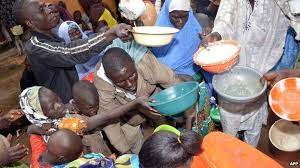Somali Magazine – The Nigerian government and its partners have disclosed that about 26.5 million people are on the verge of food insecurity, a crisis that is expected to strike early in 2024. The government projected this during the unveiling of the October 2023 Cadre Harmonise analysis on food insecurity.
An initiative focused on food and nutrition analysis (Cadre Harmonise) and the Federal Capital Territory conducted biannual studies (in March and October) across 26 states, with the government and the United Nations (UN) conducting the 2024 studies, which indicate a sharp rise from the 18.6 million people currently vulnerable to food insecurity from October to December 2023.
On the same note, about 9 million children are in danger of suffering from acute malnutrition, with 2.6 million likely to face severe acute malnutrition (SAM), which would require critical nutrition treatment.
Dr. Ernest Umakhihe, the Permanent Secretary of the Federal Ministry of Agriculture and Food Security, underscored the significance of the Cadre Harmonisé during a presentation in Abuja.
Represented by Mrs. Fausat Lawal, Director of Special Duties, Umekhihe highlighted that despite government efforts, external challenges like the ongoing global economic effects of COVID-19 and the Russia-Ukraine war, which disrupts food systems, persist.
The United Nations urges the Nigerian government, donors, and stakeholders to commit resources and implement measures to avert a potential food and nutrition disaster.
Dominique Koffy Kouacou, the FAO Representative ad interim in Nigeria and to ECOWAS, while calling on the government to expand CH coverage to the remaining 10 states, said FAO would continue to support the government and the people of Nigeria to overcome food insecurity and malnutrition.
He stated, “In 2024, alongside our partners, FAO’s focus will be on agrifood systems transformation with deliberate attention on resilience-building, nutrition-sensitive agriculture, livestock, fisheries, and providing extension services.”
The Office for the Coordination of Humanitarian Affairs (OCHA) reported that floods in October 2023 in Adamawa impacted around 8,500 households, leading to mass displacements, particularly among women, children, and the elderly.
Such extreme weather patterns, linked to the El Niño phenomenon, are further undermining food security.
“Food insecurity and malnutrition are among the main drivers of humanitarian need in the BAY states,” said Mr. Trond Jensen, the head of OCHA in Nigeria.
UNICEF’s Country Representative, Ms. Cristian Munduate, emphasised the urgent need for action. She said, “Every child deserves proper nutrition and a life free from hunger. It’s not merely a responsibility but a moral duty for governments and the global community to ensure these rights are upheld.”
Persistent violence in the north-eastern states of Borno, Adamawa, and Yobe (BAY) is also one of the factors that has led to food insecurity in Nigeria.
“The hunger crisis in Nigeria, fueled by the ongoing conflict in the northeast, needs urgent addressing.
“Restoring peace in the northeast is critical for us to build pathways to production and achieve the northeast’s potential as the food basket of the country,” said David Stevenson, WFP’s Country Representative.
Trend analysis for the northeastern states indicates consistently high or rising food insecurity levels since 2018. Over 4 million people have needed urgent assistance annually since June 2020.
Out of 18.6 million people who experience food insecurity today, 3.3 million live in the northeastern states of the Bay region. This number might rise to 26.5 million nationwide by the height of the 2024 lean season (and to 4.4 million in the Bay States) if immediate action is not taken.
The United Nations underscores the need for prompt support across the country and calls on the Nigerian government, donors, and stakeholders to deploy resources and put measures in place to avert a catastrophic food and nutrition crisis.

